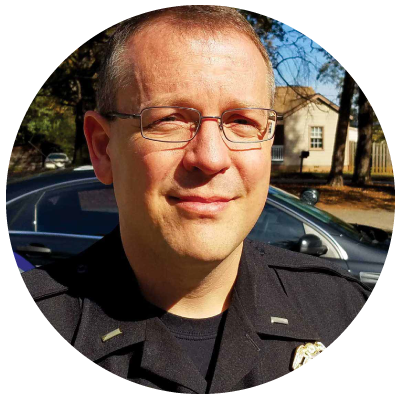 Lt. D.G. Schoeppner is Tucker’s liaison to the DeKalb County Police Department and can be followed at facebook.com/dgschoeppner or emailed at dgschoeppner@dekalbcountyga.gov.
Lt. D.G. Schoeppner is Tucker’s liaison to the DeKalb County Police Department and can be followed at facebook.com/dgschoeppner or emailed at dgschoeppner@dekalbcountyga.gov.
Should it be illegal to be homeless? I think we can all agree the answer is no.
Let me pose another series of questions:
What would you do if someone began living in your front yard? If you asked that person to leave and they refused, what would you do? Would you call the police to report them for trespassing?
What if that same person then decided to move to the sidewalk in front of your home? Would you expect the City to ask the person to move? Well, right now the City does not have the same rights you do as a property owner in this regard.
While the above scenario is not as likely to happen, what about on Main Street? Should someone be allowed to live on the sidewalk in front of one of our local businesses? When the City begins to construct the Tucker PATH trail system, should they allow people to live along that public right-of-way?
I pose these questions because the City has recently considered adopting an “urban camping” ordinance. The purpose of this is, quite literally, to keep citizens from setting up residence on public rights-of-way, like my examples above. DeKalb County Police, as well as law enforcement from surrounding municipalities, were instrumental in providing advice, experience and guidance in the creation of this ordinance.
This ordinance would make camping on public property an arrestable offense, but only after the person has been given clear notice that they are not supposed to be there and ample opportunity to leave on their own.
The resistance to this ordinance has mostly been in the form of folks that view this as an assault on persons experiencing homelessness. In my 19 years’ experience as a police officer, this is a very narrow way of looking at the extremely complex issue of homelessness. Chronic homelessness won’t be solved by this ordinance, but it can be a tool to encourage people to accept services.
Another common objection is that the City should be exploring ways to help the homeless and not arrest them. I don’t view these things as mutually exclusive. Again, I have almost two decades of experience with my share of responding to calls about people experiencing homelessness.
I always asked them why they didn’t go to a shelter. Some would say it was because the shelter wouldn’t let them stay there while they were on drugs. Others said they would just rather stay on the street. Unfortunately, I never once had a homeless person accept a ride to a shelter. I know it may take years of effort and coordination for someone to accept this help, but I kept trying.
Early on during the pandemic, the DeKalb County Homeless Task Force was able to successfully place some people experiencing homelessness from throughout the County in hotels for temporary shelter. I’m hoping this first step will help them obtain more permanent housing and support.
Even with the support of DeKalb County’s Homeless Task Force and the resources they provide to us including social workers, some people considered chronically homeless will not voluntarily accept help.
Does this mean we should allow people to live in the public right-of-way, under bridges and areas around underpasses, and along the railroad tracks? These places are not designed for, nor maintained as, living accommodations. It is a public safety risk for individuals living in those spaces as well as for others who use those spaces for their intended purposes.
Recently in Marietta, an alert CSX train conductor was able to stop his mile-long train from running over a man identified as homeless who fell on the tracks and could not get up due to hypothermia. And who can forget March of 2017 when the bridge on I-85 caught fire and collapsed? As it stands now, landscape crews cannot perform basic maintenance along two sections of highways in our city due to the unsanitary living conditions of camps. We’ve been informed GDOT does not have enough resources nor HAZMAT-trained crews to do the work either.
DeKalb County Police, along with the County’s Homeless Task Force, have visited these areas offering services and the help has been refused. What if we had a law that encouraged them to accept support or, as a last resort, through a judge compelling them into a program? It’s not the most elegant solution, but there has been some success with DeKalb County’s mental health and drug courts.
Having said all this, I will say again that it is an extremely complex issue. While I don’t have a solution (if any of us did, it would be solved by now), not adopting this ordinance and maintaining the status quo is not a solution either.

